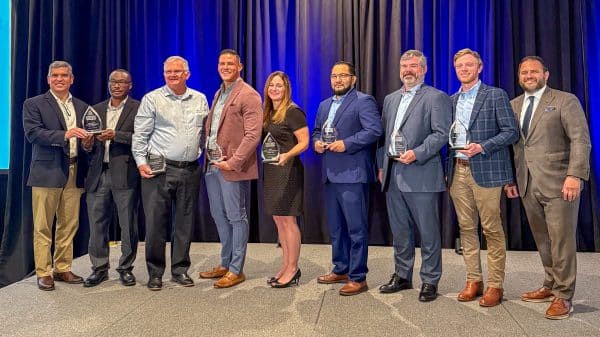With the dependency on technology growing, the threat of global warming and increasing prices for consumer goods, the reliance on a large supply of clean, affordable energy is an issue across the globe.
Here in the Peach State, Georgia’s largest electricity provider assured the audience at the Southwest Gwinnett Chamber‘s First Friday Breakfast, that it is focused on the future of energy.
Insights from an expert
John Asbell, Georgia Power’s area manager for external affairs, told attendees that the company has many solutions for renewable energy, grid modernization and electric vehicle infrastructure.
He discussed ways to promote EV adoption and stressed the importance of workforce development and education. He talked about the need for big infrastructure investments and the role of the Public Service Commission in creating programs to support these initiatives.
Georgia Power has four key areas of focus: strengthening the electric grid, transforming how energy is made, investing in renewables and cleaner energy and growing with the state.
“We got a lot of new people coming into the state,” said Asbell. “Our main job is to provide clean, safe, reliable and sustainable energy. We’ve got about three to seven million customers around the state of Georgia.”





To provide residents and businesses with enough electricity, Georgia Power has to look well into the future. Every three years it reassesses needs and prepares for changes. Along with the Public Service Commission, it builds out 20-year plans to make sure it is in line with growth patterns.
“We make sure we’re resilient and advocate neoconservatives in strengthening the grid transforming how we make energy, investing in renewables in cleaner energy,” he said. “We invested over $10 billion in new and upgraded infrastructure over the last 10 years.”
That has resulted in focused attention on nuclear energy, electric vehicles and grid modernization.

Clean energy
“Back approximately 15 to 20 years ago, 74% of all our generation relied on 30-plus generators around the southeast,” said Asbell.
“We’re the largest operating company of the Southern Company, our holding includes companies like Alabama Power, but we’re the largest operator by customers,” said Asbell.
With such a large footprint, Georgia Power has an aggressive plan to invest in renewables and cleaner energy resources. Currently, Georgia ranks in the top 10 nationally for solar installations. By 2025, Georgia Power will grow solar energy by more than 70% or one-fourth of its total generation capacity.
The company also plans to double its renewable generation to nearly half its total generation capacity by 2025.
As the company seeks cleaner and less costly ways to generate power, the need for energy grows.
“Because of transportation, because of the growth of the state of Georgia, we were projecting around 400 megawatts of growth at the end of June,” he said. “In the next few weeks, we upped the projection to 6,600, because of the unprecedented number of people coming to the state of Georgia.”




Electric vehicles
Georgia aims to increase EV charging infrastructure to support 18,000 chargers by 2030. There are currently a little more than 6,400 EV charging stations statewide. It is among the top 10 states with level 2 and 3 electric vehicle charging.
That has prompted Georgia Power to significantly invest in infrastructure for electric transportation and solar energy.
According to the U.S. Department of Transportation, a fast-charging station outputs 50 to 350 kilowatts in about 20 minutes. If those chargers are hard-wired to the power grid, just one could use as much energy as a supermarket in a day, according to Energy Star.
“Electric vehicles, that’s another technology we’re investing heavily in,” said Asbell.
There are three ways Georgia Power is committed to improving access to EVs. The first is investing $10 billion in improvements in the grid. It also plans to increase load growth so that EVs don’t have to compete with other energy users. And more investments will be made in solar-powered charging stations.
“We’re working hard with our communities. We’re a leader in economic development, both nationally and internationally,” he said mentioning Hyundai’s $7.6B EV Metaplant in Savannah as well as the Kia plant in West Point.
“It just opened up this week,” he said. “We’re in the midst of working with these companies … to bring that electric transportation technology integrated into our system. We’re very close at the community level and at the industry level.”
That’s why officials from local municipalities and companies must discuss electric vehicle adoption incentives and infrastructure development with local businesses and residents.



Going nuclear
“In 2009, 24 different state utilities had the same idea that we did to build nuclear plants. We’re the only company that succeeded,” said Asbell.
Plant Vogtle is a long-term investment to benefit customers for the next 60 to 80 years, according to the energy company. It can generate power 24/7 and while fuel prices are increasing, costs for nuclear-generated power are lower and more stable – costing three to six times less than coal and natural gas.
What’s more, Vogtle’s new units are clean energy sources producing zero air pollution.
“Plant Vogtle is projected to power more than a million homes and businesses,” said Asbell. “Once completed, it will generate more carbon-free energy than any other energy facility in the U.S.”
Photo caption: John Asbell, Georgia Power’s area manager for external affairs // Photos by George Hunter















